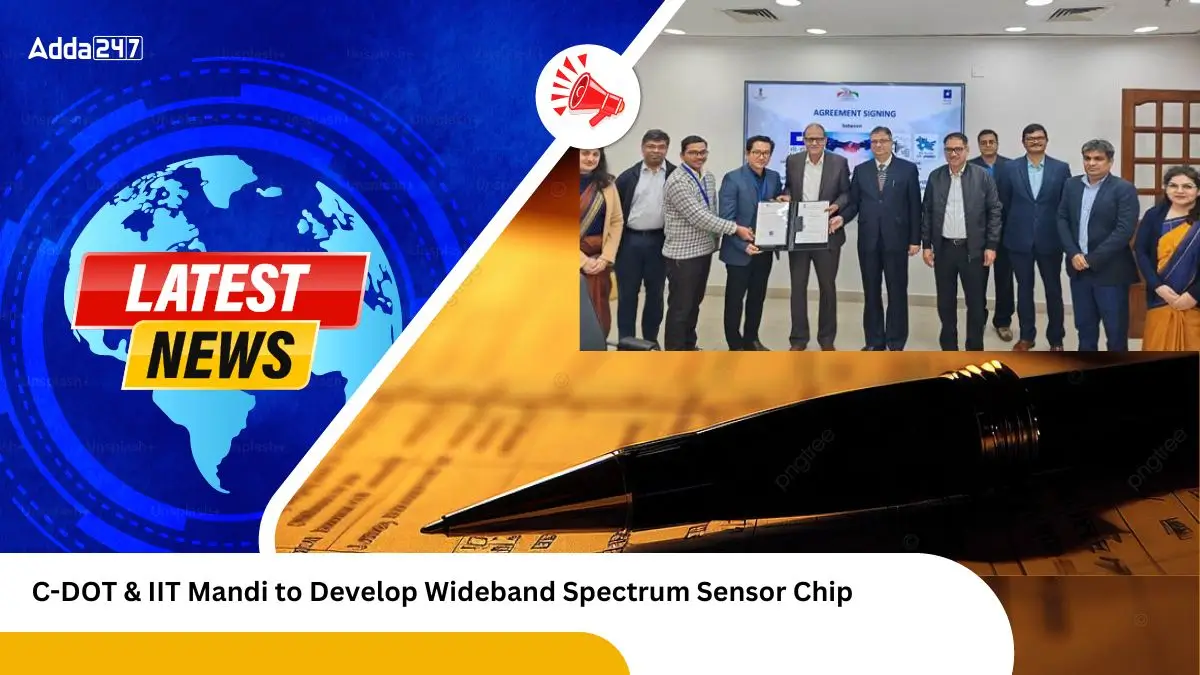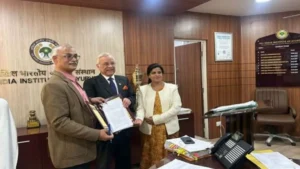The Centre for Development of Telematics (C-DOT), in collaboration with IIT Mandi and IIT Jammu, has taken a significant step in developing state-of-the-art telecommunications technology by signing an agreement for the development of a Wideband Spectrum-Sensor ASIC-Chip. This project is aimed at enhancing spectrum utilization, ensuring efficient broadband services, particularly in rural India. It falls under the Telecom Technology Development Fund (TTDF) scheme, supporting India’s vision of Atmanirbhar Bharat and Make-in-India.
Key Highlights
Project and Goals
- Development of Wideband Spectrum-Sensor ASIC-Chip to improve spectrum efficiency.
- Focus on designing hardware-friendly communication algorithms for wideband spectrum sensing.
- Target spectrum beyond 2 GHz bandwidth to utilize under-utilized bands or white spaces.
- Aim to enhance broadband access in rural India by leveraging spectrum holes.
Technological Innovations
- Spectrum sensing enables Cognitive Radio to adapt to the environment without interfering with the primary network.
- Development of efficient hardware architectures for,
- Short sensing time
- High data throughput
- Enhanced hardware efficiency
- Initial emulation of designs in the FPGA environment followed by ASIC semiconductor-chip development.
- Demonstration of a wideband cognitive radio module for the 6 GHz satellite band (5.925–7.125 GHz).
Key Benefits
- Boosts throughput of cognitive radio networks.
- Enhances spectrum utilization efficiency for communication systems.
- Creates intellectual properties (IPs) for dynamic spectrum access technology.
- Aligns with the objectives of the India Semiconductor Mission.
Supporting Schemes and Vision
- Project funded under the TTDF scheme by the Department of Telecommunications (DoT).
- Supports the Make-in-India initiative and Atmanirbhar Bharat vision.
- Plays a vital role in bridging the digital divide in India.
Key Attendees at Agreement Ceremony
- Dr. Raj Kumar Upadhyay, CEO, C-DOT
- Dr. Rahul Shrestha, Principal Investigator, IIT Mandi
- Dr. Rohit B. Chaurasiya, Co-Investigator, IIT Jammu
- Dr. Pankaj Kumar Dalela and Ms. Shikha Srivastava, Directors, C-DOT
Remarks by Officials
- Dr. Upadhyay: Highlighted the importance of indigenous spectrum sensing technologies.
- Dr. Shrestha and Dr. Chaurasiya: Reaffirmed commitment to dynamic spectrum access technology and research infrastructure enhancement.
| Summary/Static | Details |
| Why in the news? | C-DOT & IIT Mandi to Develop Wideband Spectrum Sensor Chip |
| Project | Development of Wideband Spectrum-Sensor ASIC-Chip |
| Institutions Involved | C-DOT, IIT Mandi, IIT Jammu |
| Supporting Scheme | Telecom Technology Development Fund (TTDF) |
| Objective | Enhance spectrum utilization and provide broadband in rural India |
| Technological Focus | Wideband spectrum sensing beyond 2 GHz |
| Key Benefits | Improved spectrum efficiency, boosted cognitive radio throughput |
| Target Band | 6 GHz satellite band (5.925–7.125 GHz) |
| National Missions Supported | Make-in-India, Atmanirbhar Bharat, India Semiconductor Mission |
| Significance | Bridging the digital divide, fostering indigenous telecom technology |



 Why the Adani-Marseille Pact Could Be a ...
Why the Adani-Marseille Pact Could Be a ...
 AIIA Signs MoU with General Insurance Co...
AIIA Signs MoU with General Insurance Co...
 Bharat Taxi Partners with AAI to Launch ...
Bharat Taxi Partners with AAI to Launch ...








